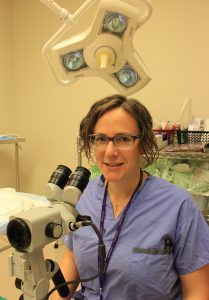
Sheona Mitchell-Foster
Dr. Sheona Mitchell-Foster is an Obstetrician Gynecologist and Assistant Professor with the Northern Medical Program. She completed her undergraduate medical training at the University of Calgary, and her specialty training and Clinical Investigator fellowship in Vancouver at the University of British Columbia. Sheona also holds a Masters of Public Health degree from John Hopkins Bloomberg School of Public Health. She was recently awarded a Division of Gynecologic Oncology Research Award for her project ‘Decreasing Barriers to Engaging in Colposcopy for Women Living in Northern British Columbia through Mobile Technology’ with Drs. Heather Armstrong and Melanie Murray.
Where do you work and live (e.g. what is your day job?)?
I work in Northern BC and live in Prince George. I divide my time between a General Obstetrics and Gynaecology practice, research and teaching in the Northern Medical Program. Primarily my practice is Prince George; my role also involves telehealth and occasional trips to the broader community.
What is your primary research focus?
Overall my focus is on the reproductive health of marginalized women with a focus on Northern, Rural and Remote populations in Canada as well as in East Africa. My two main areas of work within that broad field are 1) Screening for cervical cancers and addressing barriers to screening and 2) Perinatal substance use with a focus on culturally safe care.
What does culturally safe care mean?
Culturally safe care means being aware of our colonial history and our medical and social-care systems’ place within that historical context. It also means being aware that this history has caused intergenerational trauma. Trauma impacts the way that women are able to engage with an ultimately colonial health care system, creating layers of barriers to accessing care. Trauma informed care is about being aware of these barriers and being aware of how you, as a care provider, can minimize these barriers from your place within the system.
What drew you to that subject?
Righteous indignation! Really, it came from a deep awareness of shocking health disparities for women in Canada and globally, despite a wealth of evidence to support good reproductive care. All women, no matter where they live and who they are, should have access to the highest quality, evidence based care. Through research I want to create evidence to support health policies and practices that can be transformative in decreasing barriers to accessing reproductive and pregnancy care.
What do you find are the biggest challenges in pursuing research while being a clinician?
Working in an under-serviced area (rural BC) means that the clinical need is high. It can be difficult to make time for research because clinical care always has more urgency – the patient is there in front of you. I am passionate about my research but there is growing clinical need that cannot be ignored. Also there are mentoring and teaching commitments that come with being part of the Northern Medical Program. Those pressures aside, I feel privileged to provide care in the north.
What are the greatest supports for your research?
The Northern Medical Program provides administrative supports that I am very grateful for. The department of obstetrics and gynaecology is also incredibly supportive of my research program. I have phenomenal mentors that I am intentional about connecting with. And my community partners motivate and energize my work – my partnerships with Indigenous organizations and community groups are what keep my work moving forward and ensures that I am accountable for the direction of my research program.
What are your future plans and goals? What would you like your research to achieve?
To survive as an early career researcher would be ideal! I would love to see a real focus on reproductive care for women in rural and remote geographies. My goal is to build a sustainable research program that supports students from rural and remote areas to carry out research in those areas. I would also like to connect the experiences in rural and remote geographies of Canada to Global Health and move forward work in reproductive health globally.
When you aren’t busy being a clinician and a researcher – what do you do?
I try to ensure there are no obvious blotches of oatmeal on my clothing! I am a mom to three small children. Weather permitting I bike, cross-country ski, snow board and generally take advantage of living in an amazing community like Prince George.
What would you be doing if you weren’t a clinician-scientist?
I would be a super-hero, battling reproductive injustice – the Reproductive Renegade.
How do you balance your multiple roles – clinician, researcher and administrator?
With difficulty! The way I approach the diverse roles is not with time management. Rather than time, the commodity that I look at is energy. I try to focus on the things that energize me; obviously there are some things that I have to do, but overall I try to be intentional about the types of projects and roles that I take on. For me, concentrating on the things that energize me allows me to be more sustainable in the long-term.